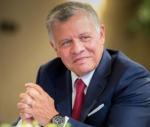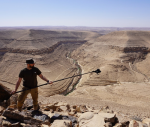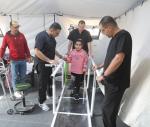You are here
Israeli nuclear threats emphasise importance of establishing free zone in Middle East
Nov 30,2023 - Last updated at Nov 30,2023
The fourth session of the Conference on the Establishment of a Middle East Zone Free of Nuclear Weapons and Other Weapons of Mass Destruction (WMD), which convened mid-November, coincided with the waves of criticism against Israeli Heritage Minister Amihai Eliyahu’s statement calling for dropping a nuclear bomb on the Gaza Strip. The Israeli minister's call to strike the Gaza Strip with a nuclear bomb came in the context of Israeli efforts to strengthen strategic and tactical deterrence in anticipation of the conflict expansion in the region.
Although Israeli Prime Minister Benjamin Netanyahu criticised Eliyahu’s statements, such a statement is a clear violation of the international law regulations and a threat to regional security. This requires a necessary refocus on establishing a nuclear weapons and WMD free zone in the Middle East.
However, Israel has maintained a deliberate ambiguity policy regarding its nuclear programme for 60 years. The Israelis never deny nor admit to having nuclear weapons, instead they repeat that "Israel will not be the first state to build nuclear weapons in the Middle East". Isarel still refuses to join the Nuclear Non-Proliferation Treaty 1968 and its Additional Protocol 1995, under the pretext that joining the treaty would jeopardise its national security.
Israel's categorical refusal to participate in the conference or join the Treaty on the Non-Proliferation of Nuclear Weapons is an evidence of its lack of respect for international efforts aimed to establishing a nuclear-weapon-free zone. Moreover, the Israeli threats might trigger nuclear arms race in the Middle East.
Finally, against the backdrop of escalating violence in the Middle East as a dangerous expansion of the conflict in the wider region, the international community should take this threat seriously and establish a nuclear weapons free zone in the Middle East.
Rakan Nawaf Al Ghaniem is a research fellow at the Arab Institute for security Studies. [email protected]













Add new comment